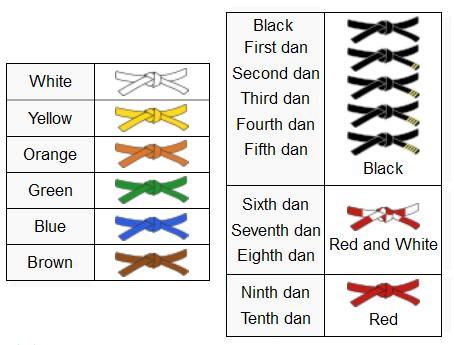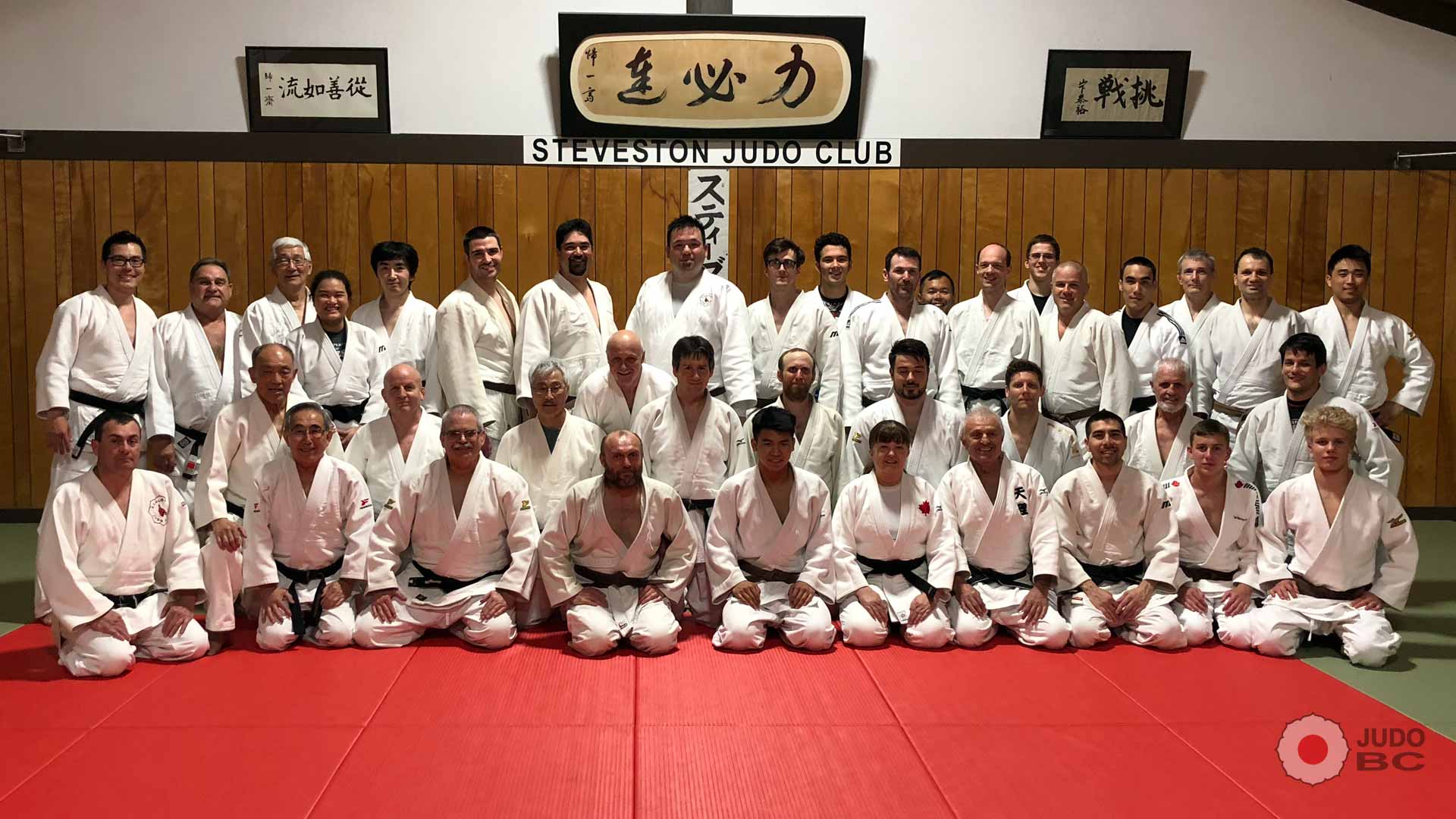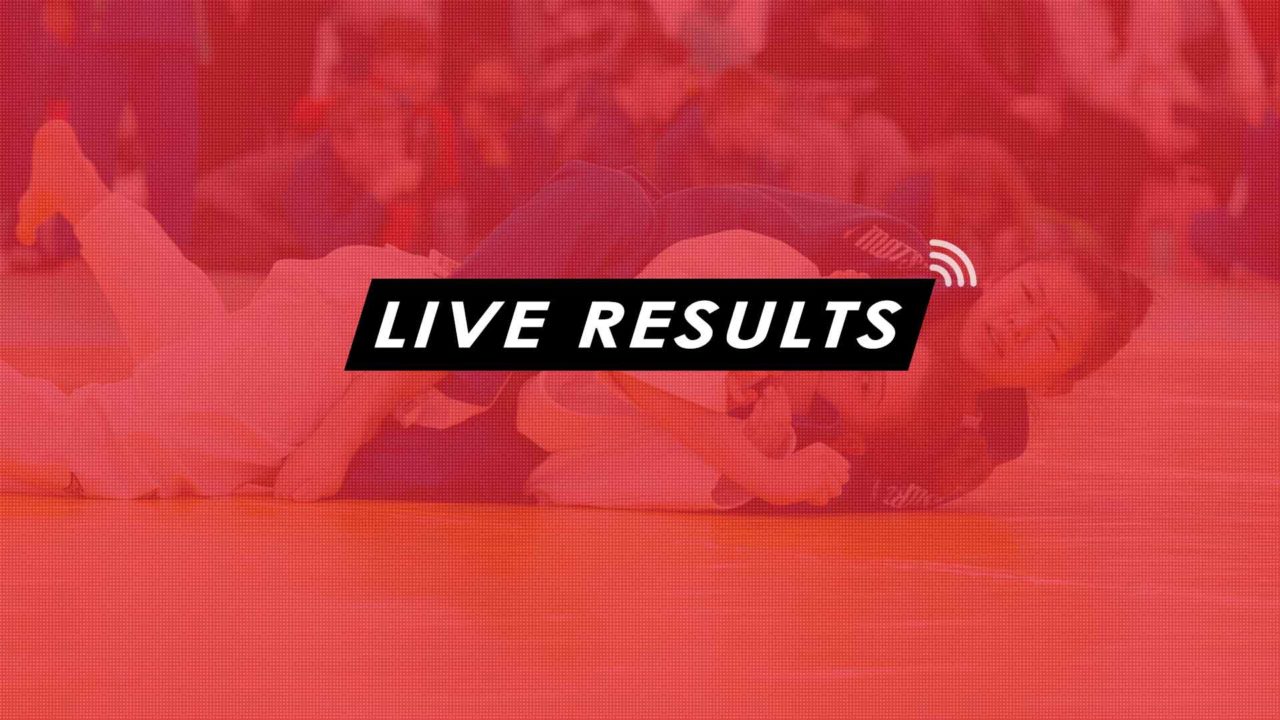What is grading?
A progressive learning system is used in judo to promote participants who reach a certain level of skill and knowledge. This progression is monitored by using belts of different colours. The learning system is divided into two parts:
- Kyu grades (white to brown belt also know as colour belts or mudansha which is japanese for “one without a dan”)
- Dan ranks (Black Belt)

Kyu ranks include the following belts:
- White
- White-yellow
- Yellow
- Yellow-orange
- Orange
- Orange-green
- Green
- Green-blue
- Blue
- Blue-brown
- Brown
These ranks are administered by clubs in BC. Clubs promoto their students based on the Judo Canada Mudansha (kyu) Syllabus.
The dan grades include 10 degrees starting from the black belt (Shodan):
- Shodan
- Nidan
- Sandan
- Yondan
- Godan
- Rokudan
- Shichidan
- Hachidan
- Kudan
- Judan
Dan grades are defined in the Yudansha (Dan) Grade Syllabus and are administered by Judo Canada and Judo BC. Candidate for these ranks must gain points from the date of their most recent promotion by their involvement in judo.
For shodan to godan there are two grading streams. The main steam is the technical stream in which black belt candidates gain points toward their promotion is by their involvement in judo, including but not limited to, being active at their club, competing, coaching or refereeing at provincial events and attending provincial level clinics, camps, seminars, courses. The second stream is the competitive stream. Candidates in this stream can only gain points towards their promotion by winning matches in the U18 (Nationals & Canada Cup only), U21 & Senior categories at national or international competitions (as listed in the National Team Handbook Policy). Based on this the competitive stream is mostly for high performance athletes involved in the Judo BC Provincial Team program.
Black Belt Grading Process in British Columbia
Once you have been promoted to ikkyu (brown belt), please follow these steps to prepare for you black belt grading:
- Apply for a Judo Canada passport. This is required for black belt grading.
- Learn/practice nage-no-kata and the required nage waza & katame waza techniques. See below for videos and other nage-no-kata recourses. The nage waza & katame waza techniques are listed in the Judo Canada Yudansha Grading Syllabus.
- Find a judoka to be your uke and attend a kata clinic if possible.
- Track all your judo activities. As outlined in the Judo Canada Yudansha Grading Syllabus, grading candidates are required to collect points in order to be eligible for grading. The amount of points required varies with each dan grade. Points are awarded for Provincial level activities including, competing, officiating, volunteering and coaching at Provincial level tournaments & for participating in Provincial level camps, kata clinics, coaching courses and referee workshops. Points are also awarded for each year you are active in judo at your club.
- Once you have the required points, talk to your sensei to see if they think you are ready to grade for shodan.
- Submit your Judo Canada pre-approval application and grading fees. This must be submitted 45 days prior to the grading exam date.
- Judo Canada, your sensei, and then Judo BC will review your application to ensure the accuracy of information.
- Once you have been pre-approved the final step is to register with Judo BC to attend the grading exam. The registration deadline with Judo BC is 30 days prior to the grading exam date. Stayed tuned to the Judo BC newsletter for black belt grading dates, pre-approval and registration deadlines.
For more information about black belt grading please talk to your sensei and review the Judo Canada Yudansha Grade Syllabus.
What is Kata?
From https://judocanada.org/kata/ :
“Jigoro Kano Shihan, the founder of judo, explains there are essentially two ways of practicing judo: randori (with its variant in competition) and kata. Kata literally means “form”. Kata is practiced according to a pre-established system of codified movements, while randori is practiced freely. The goal of kata is therefore to learn and practice the fundamental principals and techniques of judo. It is important for the student and teacher to incorporate kata in their training. Kata provides the judo instructor a benchmark for reference for every technique included in the varied forms, as each kata technique is executed in its purest form with uke attacking from the best possible position to maximize the effectiveness of that technique.
A kata competition is where judo athletes perform a kata in a competition setting, with five presiding judges, against other judoka who perform the same kata. All kata competitions are evaluated according to the IJF Kata Competition – Criteria for the Evaluation. At the Canadian National Judo Championships there are five kata events (1-5 listed below) and each of the categories features a Senior and U23 division.”
Typically, kata competitors compete in one or more of the following kata – depending on the type of competition:
1.Nage no Kata – forms of throwing
2.Katame no Kata – forms of grappling or holding
3.Ju no Kata – forms of gentleness and flexibility
4.Kodokan Goshin-Jutsu – forms of Kodokan self-defence
5.Kime no Kata – forms of decisive techniques
6.Koshiki no Kata – forms of classics (conducted at a limited number of international events)
7.Itsutsu no Kata – form of five (currently not competed)
8.Kodomo no Kata – kata for the teaching of basics to young children (not competed)
For more information about the Judo BC Competitive Kata program please contact kata [@] judobc.ca
Black Belt Grading Exams
Technical stream candidates are required to perform specific kata(s) at their exam according to their rank. In addition to the required kata, candidates will also be asked to demonstrate, according to their rank, nage waza & katame waza techniques. Please refer to A the Judo Canada Grading Syllabus for a listing of the katas & techniques for each rank.
Resources
- Judo BC Grading and Kata Board
- Upcoming Grading and Kata Events
- Apply for a Judo Canada Passport
- Foreign Black Belt Recognition Application Form
- Judo Canada Grading Information Page
- Kokodan Grading Requirements
- Judo Techniques at IJF
Videos
Judo Canada Gokyo videos
The Judo BC Grading Board recommend the follow videos produced by the Kodokan Institute.
Kime no Kata
More Videos
The following information and videos are courtesy of Gord Okamura and Kelly Palmer of Judo Alberta:
Nage no Kata
Here is the Nage no kata seminar (notice the use of sensei’s stick).
Now here is a performance by the Gold Medal team from Japan in the 2017 World Championships in Olbia, Italy (notice the spacing, the rhythm, the control, etc).
Kodokan Nage no Kata (in English).
German Nage no Kata (German titles, but pictures are great!)
Katame no Kata
Here is a seminar that was conducted after the 2016 World Championships in Malta.
Here is a practice session by the Gold Medal team from Japan before the 2015 World Championships in Amsterdam, Netherlands. This video is especially good due to the close camera angle.
Here is another interesting resource – this is a Dutch team who do well in European tournaments. This video has their Kata viewed from two angles at the same time.
Ju no Kata
Here are two Ju no kata seminars from 2015 Worlds and the 2016 Worlds (Note: There is a demonstration by the German team who have won the Gold medal at the end of the 2016 clinic)
https://www.youtube.com/watch?v=laA1R7EVg4M
Here is a performance by the Gold Medal team from Japan in the 2015 World Championships in Amsterdam, Netherlands. See Ju no kata Medalists at 0:14:32.
Kodokan Goshin Jutsu
Here is a seminar that was conducted after the 2016 World Championships in Malta.
And here is a performance by the Gold Medal team from Japan in the 2017 World Championships in Olbia, Italy (notice the spacing, the rhythm, the control, etc).
https://www.youtube.com/watch?v=t9sV9WUdh6E
Kime no Kata
Here is the 2015 Kime no Kata seminar held after the Worlds.
Here is a performance by the Gold Medal team from Japan in the 2015 World Championships in Amsterdam, Netherlands. See Kime no kata Medalists at 0:49:33.
Printed Resources
The Kodokan has made available on their website free downloads of the Kodokan guide for each kata. You can find them all here:
Kata Judging and Scoring
2017 Kata judging clinic held in the USA by a member of the IJF Kata Commission (Michael Kozlowski):
- Part 1 https://www.youtube.com/watch?v=O0wCCc1ufZY
- Part 2 https://www.youtube.com/watch?v=e36-JYqLHAU
- Part 3 https://www.youtube.com/watch?v=ec_0lIh5jqg
Grading FAQs
How do I apply for a Judo Canada passport (requirement for black belt grading)?
Apply online here – https://registration.judocanada.org/register/judo-canada-passport/1000578/
Where can I learn what I need to know for black belt grading?
Talk to your sensei. If you are a brown belt, attend a few kata clinics.
How do I know when I’m ready to grade for my black belt?
Your sensei will let you know when they think you are ready for grading.
My sensei says I’m ready to grade for my Black belt, now I need to know if I have enough points to grade.
Complete the Judo Canada online black belt grading application to determine if you have enough points to grade. You will need the following information to complete the online application:
- Date of last promotion
- Judo Canada number
- Provincial level and higher activities since last promotion including camps, clinics, tournaments, referee and coaching
Don’t forget to apply for a Judo Canada passport if you don’t already have one. This is required for all black belt promotions.
Where can I find out more about the grading requirements?
Click Here for the Judo Canada colour belt grading recommendation and HERE for the Judo Canada National Grading Syllabus
Who keeps track of my points for grading?
Starting September 1, 2019 Judo BC no longer tracks grading points due online grading application procedures introduced by Judo Canada in the 2019-20 season. Clubs can request the records we have on file for their students and judo players are encouraged to keep track for their own points.
When are provincial black belt grading exams held each year?
Traditionally grading is held in December and June each year in metro Vancouver.

 SHOP
SHOP













